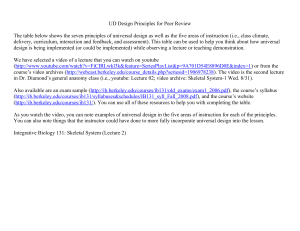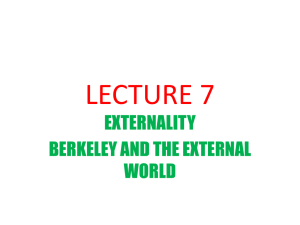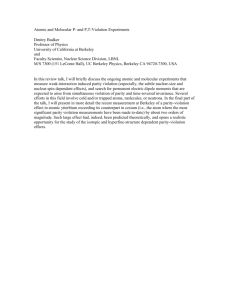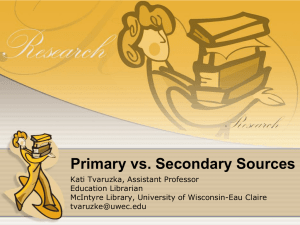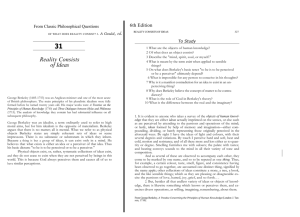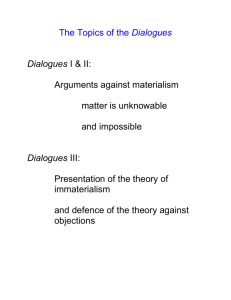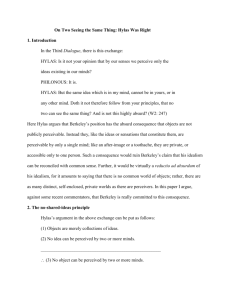berkeley
advertisement
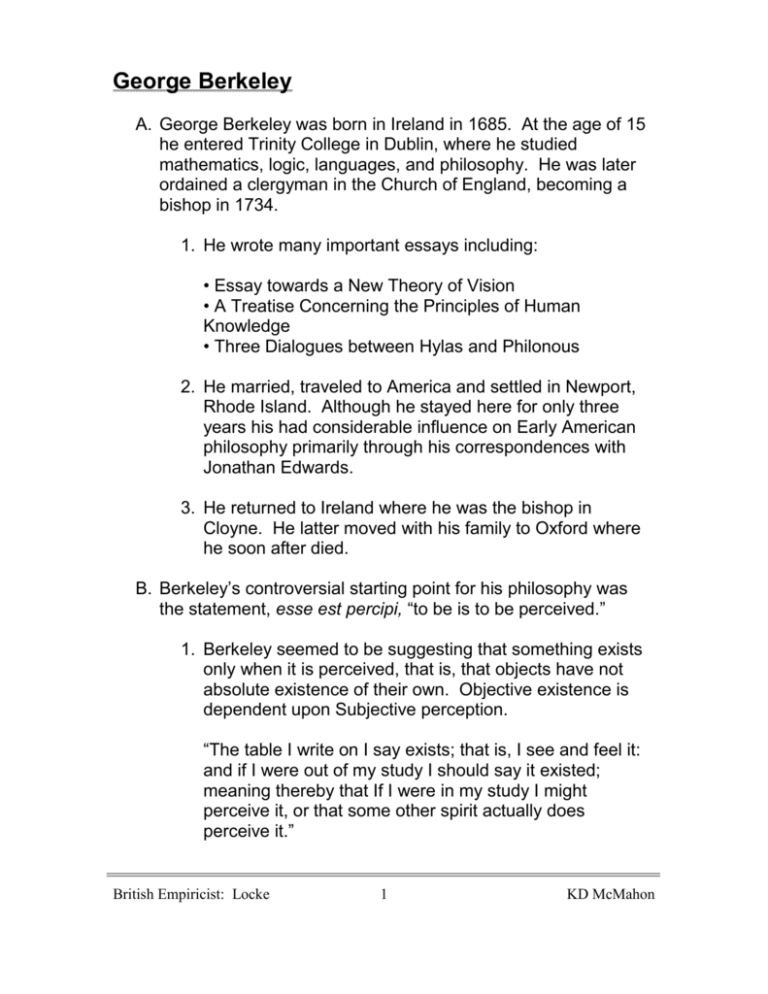
George Berkeley A. George Berkeley was born in Ireland in 1685. At the age of 15 he entered Trinity College in Dublin, where he studied mathematics, logic, languages, and philosophy. He was later ordained a clergyman in the Church of England, becoming a bishop in 1734. 1. He wrote many important essays including: • Essay towards a New Theory of Vision • A Treatise Concerning the Principles of Human Knowledge • Three Dialogues between Hylas and Philonous 2. He married, traveled to America and settled in Newport, Rhode Island. Although he stayed here for only three years his had considerable influence on Early American philosophy primarily through his correspondences with Jonathan Edwards. 3. He returned to Ireland where he was the bishop in Cloyne. He latter moved with his family to Oxford where he soon after died. B. Berkeley’s controversial starting point for his philosophy was the statement, esse est percipi, “to be is to be perceived.” 1. Berkeley seemed to be suggesting that something exists only when it is perceived, that is, that objects have not absolute existence of their own. Objective existence is dependent upon Subjective perception. “The table I write on I say exists; that is, I see and feel it: and if I were out of my study I should say it existed; meaning thereby that If I were in my study I might perceive it, or that some other spirit actually does perceive it.” British Empiricist: Locke 1 KD McMahon 2. This radical notion was in part developed as a result of Locke’s theory of knowledge. Locke had concluded that objects possessed substance but that this substance was “something we know not what.” a. Berkeley took the next step by stating that this substance was nothing—nothing but ideas. b. When Berkeley examined the processes of his mind in their reflection on objects he concluded that there were no circumstances he, which he directly experienced, objects independent of his mental ideas of them. “When we do our utmost to conceive the existence of external bodies we are all the while contemplating our own ideas.” c. For example: Berkeley: What is a cherry? Answer: it is red, soft, round sweet, and fragrant. Berkeley: All of the qualities are ideas in the mind that the cherry has the power to produce through the senses. The very existence of these qualities consists in their being perceived. “In truth, the object and the sensation are the same thing, and cannot therefore be abstracted from each other.” A thing is therefore, the sum of its perceived qualities; hence to be is to be perceived. 3. If substance and matter does not exist, what then does exist? Spiritual beings, which are minds that perceive, are the only things that truly exist. a. Berkeley believed that the concept of matter complicated philosophy and could not be substantiated. Furthermore, if unchecked materialistic philosophies could eventually develop British Empiricist: Locke 2 KD McMahon into a “monstrous systems of atheists” which history has shown to be true. b. Nevertheless, Berkeley recognized that there would be some (many) who would criticize his ideas as absurd, to which he responded: “What therefore becomes of the sun, moon, and stars? What must we think of houses, rivers, mountains, trees, stones; nay even of our own bodies? Are all these so many chimeras and illusions of fancy?” He answers by stating that by his system, “we are not deprived of any one thing in nature. Whatever we see, feel, hear, or any wise conceive or understand, remains as secure as ever, and is as real as ever…. I do not argue against the existence of any one thing that we can apprehend, either by sense or reflection…. The only thing whose existence we deny, is that which philosophers call matter or corporeal substance. And in doing of this, there is no damage done to the rest of mankind, who, I dare say, will never miss it.” 4. In regard to science, Berkeley wanted to purge it from assumptions and misunderstandings in which scientists attribute as real things, which are not directly perceived such as force, gravity, and causation. a. Berkeley argued that just like firmness, redness, colors, smell, taste are attributed (mistakenly) to a single substance (an apple), scientists mistakenly attribute connections between individual perceptions (causation). b. We may observe that A is followed by B, by we do not experience (perceive) why this is so. Hence, the sensible world shows us neither substance nor causality. British Empiricist: Locke 3 KD McMahon 5. How then do things exist when they are not perceived by us? To this question, Berkeley responds: “When I deny sensible things an existence out of the mind, I do not mean my mind in particular, but all minds. Now it is plain they have an existence exterior to my mind, since I find them by experience to be independent of it. There is therefore some other mind wherein they exist, during the intervals between the time of my perceiving them.” Hence “there is an omnipresent eternal Mind, which knows and comprehends all things, and exhibits them to our view in such a manner and according to such rules as he himself has ordained, and are by us termed the Laws of Nature.” a. God’s ideas constitute the regular order of Nature. The ideas that exist in our minds are God’s ideas, which He communicates to us, so that the objects or things that we perceive in daily experience are not caused by matter or substance but by God. b. Therefore, perceived ideas are caused within us by the infinite Mind whereas imaginary ideas (such as causation) are the product of our finite minds. 6. Berkeley was confident that esse est percipi would undermine philosophical materialism and religious skepticism. It did not. Furthermore, Berkeley is not so much known for his Idealism, but for his taking empiricism to the next step. Berkeley had made the point that the human mind reasons only and always about a particular sense experience and that abstract ideas refer to no equivalent reality. Hume would build upon Berkeley’s empiricism and credited him with laying the foundation for which would be his philosophical program: British Empiricist: Locke 4 KD McMahon “…a great philosopher [Berkeley] has disputed the received opinion in this particular, and has asserted that all general ideas are nothing but particular ones…. I look upon this to be one of the greatest and most valuable discoveries that has been made of late years in the republic of letters.” British Empiricist: Locke 5 KD McMahon


